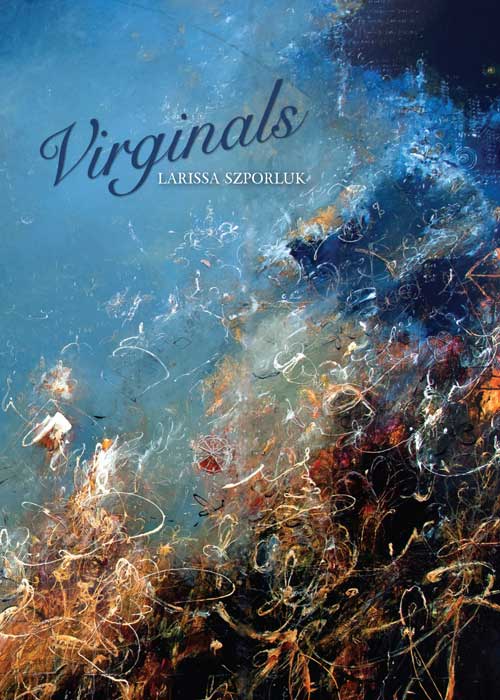
Virginals
Larissa Szporluk
April 2021
Winner of the 2018 Burnside Review Press Book Award, selected by Ed Skoog.
$12 (shipping included)
Larissa Szporluk is the author of six books of poetry and a professor of creative writing at Bowling Green State University. She has received grants from the National Endowment for the Arts and the Guggenheim Foundation and raises goats with her son.
“Szporluk has often been read and praised as a visionary surrealist, but her body of work, evinced by Virginals, shows her also as a powerful dramatist, enacting scenes rooted in very real moments of tension and danger. These shocking stanzas lay bare their speakers' violent psyches and take poet and reader to new, honest spaces cleared of niceties and decorum. In sequences of poems, Szporluk acknowledges and explores the dissonance of art and love, in narrow, unruly lines that are disarmingly direct, except the direction is towards a kind of madness. It's a relentless and overwhelming lyricism, persuasive and unforgettable.”
—Ed Skoog
“Larissa Szporluk’s Virginals is a rewilding: a return to the savage and sublime by following breadcrumbs ‘deep in the woods ⁄ where truth be told.’ Tales of birth, death, murder, and sex, the poems collected here appear to be fearless: in fact, they are brave, venturing into rarely revealed corners of the psyche. We’re lured by mesmerizing eye and ear rhymes into the bowels of the underworld, where taboo, obscene visions lurk just beneath conscious awareness, ‘in the grouse-sucked dark ⁄ of the bird-worm’s home.’ Down there, the voices of mythical and historical figures join in dissonant juxtaposition, as in the madrigals of Renaissance composer and murderer Carlo Gesualdo, whose presence haunts this collection like ‘a nursery bogey.’ Szporluk’s poems have a wildness that is wholly her own, though Plath’s rocking rhythms and Dickinson’s sacred profanity lurk in their company. Going off on the ‘long holiday away from light’ that is Virginals, we get to hear, thrillingly, who or what is singing in the dark.”
—Becca Klaver
“These poems traffic in an archetypal vale. Nimble and volatile, the thin lines dagger your eyes to the page. We are left unfettered as the great spool unwinds. Dislocated and out of time, nowhere is no better place to be, no paradise pact, each child’s lap an ossuary for parent’s bones, that is, should anyone outlast these madrigals. Sing this drowned book’s boozy-jazz betrayals, if you dare, to your lovelorn kiddies, your fleeced flocks. By hook or by crook, the rapids ridden, no one will ever thank you enough for the paddles spared, unmoored as we all are from our upturned canoes.”
—Timothy Liu
“Let the sun be ‘the cherub’s anus.’ This book is dark. The syntax-riddles sound like Emily Dickinson knew about them, but couldn't until now, across decades and bodies, admit to them. The sin must be the original, as the soul which will ‘never lift a finger, that embarrassing little snake,’ can, in Szporluk, twist away, but each poem will sit up in the déjà vu of guilt.”
—Heidi Johannesen Poon